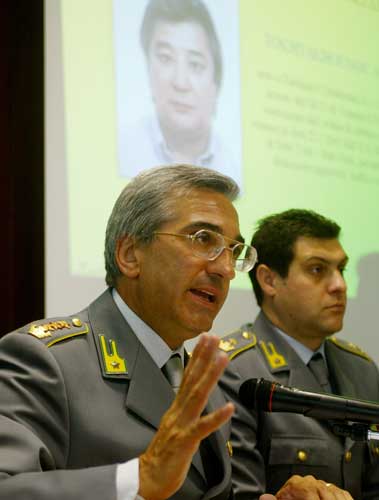Boomtime for Mafia Inc as it buys up tourist Italy
Loan-sharking and designer fakes are funding growth

Your support helps us to tell the story
From reproductive rights to climate change to Big Tech, The Independent is on the ground when the story is developing. Whether it's investigating the financials of Elon Musk's pro-Trump PAC or producing our latest documentary, 'The A Word', which shines a light on the American women fighting for reproductive rights, we know how important it is to parse out the facts from the messaging.
At such a critical moment in US history, we need reporters on the ground. Your donation allows us to keep sending journalists to speak to both sides of the story.
The Independent is trusted by Americans across the entire political spectrum. And unlike many other quality news outlets, we choose not to lock Americans out of our reporting and analysis with paywalls. We believe quality journalism should be available to everyone, paid for by those who can afford it.
Your support makes all the difference.The Italian mob has probably never had it so good. Italy's various crime syndicates – lumped together colloquially as Mafia Inc – are gobbling up petrol stations, muscling in on supermarket franchises, making loans to cash-starved businesses, taking over trattorias and acquiring buildings in swanky neighbourhoods in Rome and Milan, investigators say.
These mobsters have lots of what is in short supply these days – liquidity – as well as centuries-honed expertise in preying on the vulnerable. It means the mob is free to sink cash into two areas at the heart of the global meltdown: property and credit markets. The crime syndicates are flush with billions of euros from extortion, drug trafficking, and booming sales in fake designer clothing made in China expressly for the Italian mob.
Italy has scored some spectacular successes in its decades-long fight against the Mafia, capturing top bosses, persuading turncoats to testify, and encouraging citizens to resist shakedowns. But the mob keeps growing. In Rome, in the high-rent neighbourhoods around the Spanish Steps, Piazza Navona and Trevi Fountain, mobsters are snapping up property, anti-Mafia prosecutor Giancarlo Capaldo said. "These places are well run because they want to make money," Mr Capaldo said. He declined to identify the establishments because the probe is ongoing, adding only "you'll find some of them in tourist guide books". Capaldo's office also confiscated car dealerships in Rome from suspected Camorristi or their allies.
And, in his Naples office, customs and tax police General Giovanni Mainolfi said: "The Camorra makes the money here in the south, but it invests it in legal activities up north." In an operation codenamed "Easy Money", police this year seized a hotel in the exclusive Tuscan resort of Punta Ala, as well as a supermarket, two Ferraris, a petrol station in the wealthy Reggio Emilia region and other properties, totalling about $40m (£27m). All were believed to be owned by the Camorra,.
The Rome-based Eurispes think tank has estimated that in 2008, "Mafia Inc" earned $167bn, or about 8 per cent of Italy's GDP, from its criminal activities, nearly half of that from drugs. And Eurispes, which analyses social, economic and criminal trends, said loan-sharking brought in an estimated $17bn of that income. It calculated that some 180,000 business people got their loans, directly or indirectly, through organised crime in Italy.
A main engine of the mob's recent strength – loan-sharking – is thriving as banks hoard cash. SOS Impresa, an Italian business lobby dedicated to fighting organised crime, estimated in a report late last year that the Naples-based mob, the Camorra, has "multiplied by 100, perhaps 1,000 times, its penetration of the economic and social fabric, stepping up its business presence in our country, in Europe and the world." In Rome, Camorra men, or those in their employ, have been spotted at pawnbrokers' auctions, learning which businesses might be in financial straits, said Carabinieri Lt Col Roberto Casagrande.
The Camorra offers shaky businesses attractive interest rates, calculating that the businesses will end up part of its economic empire if the owner falls behind. The mobsters sometimes leave the original owner as a figurehead to thwart suspicion, police said. The 'Ndrangheta crime syndicate – based in Calabria, the "toe" of Italy's boot – is also taking over struggling businesses and snapping up prime northern Italian property at a bargain. Genoa Mayor Marta Vincenzi told a rally against organised crime in Naples late this spring that Mafia bosses, particularly from the 'Ndrangheta, were "gobbling up entire neighbourhoods" and pressuring merchants to pay "protection money" in the gritty, northwestern port city.
The Eurispes think tank estimated counterfeit designer goods earned the mob $8.5bn last year. The Camorra bosses have forged closer ties with mobsters in China, where fake designer clothing, shoes and accessories are churned out in factories for the mob. The returns from fake designer goods are becoming more profitable for the Neapolitan syndicate than dealing in cocaine and hashish, said General Mainolfi. He has calculated that for every euro spent making the goods, the Camorra earns 10 euros, while for every euro spent on drug trafficking, it earns six or seven euros.
Join our commenting forum
Join thought-provoking conversations, follow other Independent readers and see their replies
Comments